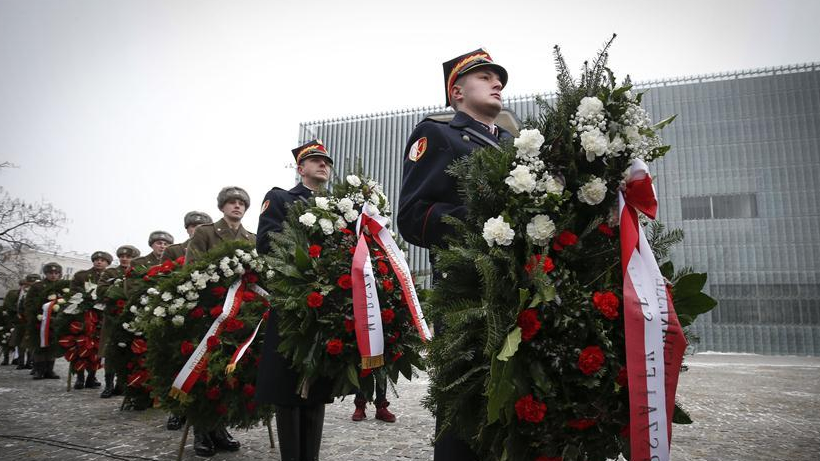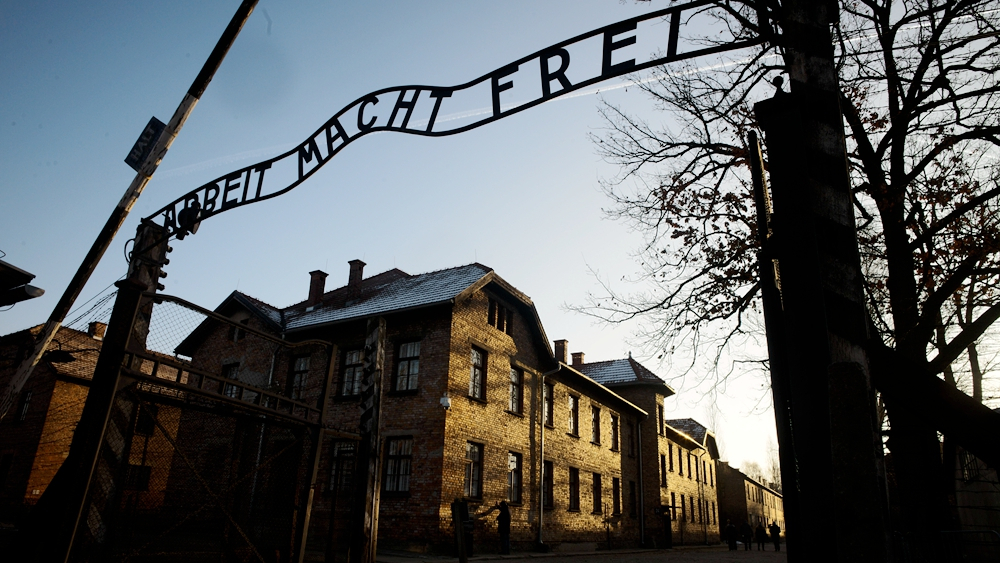
Polish soldiers during the Holocaust Remembrance Day commemoration service at the Ghetto Heroes Monument in Warsaw, Poland, January 27, 2019. /Xinhua Photo
Polish soldiers during the Holocaust Remembrance Day commemoration service at the Ghetto Heroes Monument in Warsaw, Poland, January 27, 2019. /Xinhua Photo
Editor's Note: Zhou Yongsheng is a professor at the Institute of International Relations and the deputy director of the Center for Japan Studies, China Foreign Affairs University. The article reflects the author's opinions, and not necessarily the views of CGTN.
January 27 marks the 75th anniversary of the liberation of Auschwitz. The Holocaust at the Auschwitz concentration camp was one of the most tragic massacres in human history, where Nazi Germany killed between 1.5 million to 2 million people including Jews, Soviet prisoners of war, homosexuals, Gypsies and foreigners in Germany.
It is a question worthy of consideration for generations at present and in the future how to pass on Holocaust remembrance so that the world will never again have to witness that kind of tragedy.
Alarming violent incidents in recent years constantly remind us that the world is not a peaceful place. With the rising clash of civilizations, escalating religious antagonism, and intertwined hatred among various forces, the world is not free from risks of genocide and religion-related massacres in the future. The humanity is faced with too many tensions, disputes and conflicts, with old ones constantly compounded by new ones.
According to a report by IHS Markit in January 2019, worldwide terror attacks decreased by one-third in 2018 compared to 2017, shrinking to the lowest level since 2011. This significant fall in the number of terror attacks is indeed good news for world peace, but in fact, in 2019, there are still numerous organized terrorist attacks killing civilians around the world.
On January 16, 2019, a terrorist group attacked a hotel and office building in Nairobi, the capital of Kenya, killing at least 15 people. On April 21, 2019, there were eight explosions against Christian churches in and around Colombo, the capital of Sri Lanka, killing 359 people and injuring more than 500. On July 1, 2019, a car bomb in downtown Kabul, the Afghan capital, killed at least 34 people and injured 68 others.
Such painful tragedies have shown that hatred has been plaguing some countries, regions, social classes and ethnic groups and that the clash of civilizations has become one of the most important causes for human hatred. It bears much resemblance to the Holocaust in Auschwitz where hatred was driven by tensions and conflicts in ethnicity, ideology, religion and civilization.
Remembering the Holocaust in Auschwitz may begin with reflecting on human tensions and conflicts. If we take a look at the terrorist attacks involving organized killings of civilians in the world today, there is seldom any racial discrimination and incitement as relentless as that of Hitler and his Nazi forces; rather, at present, the most threatening conflict in society is the conflict between extremist religious forces and the diverse civilizations.
The extremist religious forces attempt to establish a religious empire they perceived to be a unity of religions in the world. This obsession of the extreme religious forces is a peculiar culture that is difficult for other civilizations to understand and change, and it has seriously endangered the harmony and development of humanity.

The buildings behind the entrance of the former Nazi death camp of Auschwitz-Birkenau in Oswiecim, Poland, December 6, 2019. /AP Photo
The buildings behind the entrance of the former Nazi death camp of Auschwitz-Birkenau in Oswiecim, Poland, December 6, 2019. /AP Photo
Therefore, all governments and civil society organizations can no longer turn a blind eye to such tensions and conflicts or address them superficially with empty talk of equal religions and civilizations.
Instead, we shall seriously consider how to resolve the antagonism between different religions and civilizations, how to achieve reconciliation between them, and how to, on the basis of reconciliation, let all major religions live in harmony and all major civilizations thrive in harmony.
In essence, people in all major civilizations and religions shall refrain from emphasizing the uniqueness of their own civilizations and religions and embrace the idea of equality of all. To do so, it requires the courage to abandon egocentrism.
Any individual, organization or country is not single in existence. Each must live side by side with others. For the how-to questions, neither the United Nations or other international organizations can come up with viable solutions in the near future, but our deliberation and quest for a better world with lasting peace and sustainable development shall not cease.
(If you want to contribute and have specific expertise, please contact us at opinions@cgtn.com.)